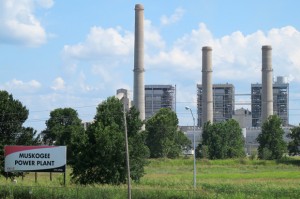Supreme Court Rules on Coal Pollution, Dealing Blow to AG Pruitt and OG&E
-
Logan Layden
Oklahoma Attorney General Scott Pruitt and Oklahoma Gas and Electric, the state’s largest utility, haven’t had much luck going up against the U.S. Environmental Protection Agency lately.
As StateImpact has reported, Pruitt and OG&E are still waiting to hear whether the U.S. Supreme Court will hear their challenge to the EPA’s regional haze rule, after lower courts sided with the agency’s attempt to clear the air on federal lands.
But if Tuesday’s ruling is any indication, the Supreme Court doesn’t appear sympathetic to Pruitt’s concerns about federal overreach. In a 6-2 decision, the court on Tuesday revived the EPA’s cross-state pollution rule, which is separate from the regional haze rule, but would also require coal-fired power plants to reduce emissions. The issue now goes back to a lower court for more consideration.
From The Associated Press’ Mark Sherman:
Power companies and several states sued to block the rule from taking effect, and a federal appeals court in Washington agreed with them in 2012.
Justice Ruth Bader Ginsburg wrote the court’s majority opinion, which reversed the lower court ruling.
… Sulfur dioxide and nitrogen dioxide pollution from power plants can be carried long distances and the pollutants react with other substances to form smog and soot, which have been linked to illnesses. The cross-border pollution has prevented many cities from complying with health-based standards set by law.
The cross-state pollution rule affects more than two dozen states, and is meant to better protect the east coast from pollution that drifts in from the west. The goal of the regional haze rule, on the other hand, is to reduce pollution at federal parks and wildlife refuges.
Opponents of the decision Tuesday said it violated the intent of the Clean Air Act, which envisions states and the EPA working cooperatively to rein in air pollution.
“The Supreme Court majority has refused to allow the states to have any voice in the practicalities of determining the impact of their emissions on neighboring states,” said Richard Faulk, senior director at George Mason Law School’s Energy and Environment Initiative…
Pruitt says he’s disappointed in Tuesday’s ruling, but vows to continue fighting what he sees as an out of control EPA.
“Congress passed environmental laws giving states primacy in this instance and others,” Pruitt says, “but over the years has deferred its authority to federal agencies like the EPA, which have rushed in to fill the vacuum and expand their authority.”
But Whitney Pearson, with the Sierra Club’s Beyond Coal Campaign in Oklahoma , called the decision a “victory for public health.”
“This means coal plants will have to reduce their nitrogen oxide emissions significantly, which should help communities impacted by smog in downwind states like Arkansas,” Pearson says. “But it will also help Oklahoma cities like Tulsa that are struggling to meet air quality standards.”
She says Public Service Company of Oklahoma — Oklahoma’s second largest utility — is implementing a plan to decommission its coal-fired power plants that should allow it to comply with both the regional haze and cross-state pollution rules.
While Oklahoma plants doesn’t fall under the full Cross-state Pollution Rule, many are affected by a supplemental rule that requires utilities to reduce nitrogen oxide emissions during the summer months.
An OG&E spokesperson says that issue will be heard separately, and that the utility will be watching the next steps carefully.

